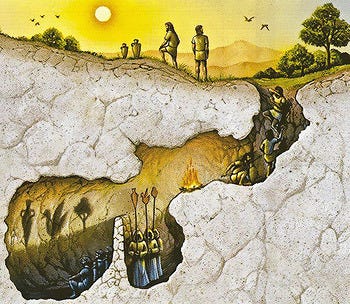Understanding Objective Reality: From Bacon to the Digital Age
Objective reality—an existence independent of perception—has long fascinated thinkers. Francis Bacon, in The Great Instauration, laid the groundwork for empiricism, emphasizing observation and systematic investigation. Simon Winchester’s much later little book How We Know What We Know gives modern readers a glimpse into this legacy by examining the tools humanity has used to build its knowledge base.
How DO we know what we know?
In this age of cognitive biases, technological complexity, and rampant misinformation, understanding objective reality remains as crucial as ever. This essay explores how humans discern reality through historical frameworks, scientific advancements, and ethical considerations.
Bacon’s Vision of Knowledge
Francis Bacon proposed a new approach to knowledge, rejecting reliance on tradition and advocating for direct observation and experimentation. His Great Instauration envisioned a society where systematic inquiry would uncover objective truths. Bacon’s method remains foundational to science, providing a pathway to reality by prioritizing evidence over assumptions. This disciplined pursuit is echoed in Winchester’s reflections on humanity’s collective journey to enlightenment.
Tools and Technologies of Knowing
Simon Winchester details how tools like maps, microscopes, and telescopes revolutionized humanity’s capacity to observe and understand the world. In modern times, technologies such as machine learning and satellite imaging exponentially increase our ability to measure reality. However, these advancements also present challenges. Overreliance on algorithms can obscure subjective influences embedded in their design, raising questions about the objectivity of the knowledge they produce.
The Impact of Cognitive Bias
Despite technological progress, humans remain subject to cognitive biases that distort perception. The confirmation bias, for instance, leads individuals to favor information aligning with preexisting beliefs. Works like Daniel Kahneman’s Thinking, Fast and Slow show that recognizing and mitigating these biases is essential to approach objective reality. Winchester’s anecdotes remind readers that even experts must guard against such pitfalls.
Ethical and Societal Challenges
As knowledge expands, ethical considerations grow more pressing. Bacon envisioned the pursuit of knowledge as inherently virtuous, but today’s discoveries—whether in climate science or artificial intelligence—carry profound moral implications. Winchester emphasizes the responsibility accompanying knowledge, urging societies to use their understanding for the collective good rather than exploitative ends.
Conclusion
From Bacon’s seventeenth-century call for systematic inquiry to today’s technological marvels, humanity’s quest to grasp objective reality continues to evolve. Yet, the challenges of cognitive biases, ethical dilemmas, and the sheer complexity of modern knowledge systems persist. By reflecting on these issues, individuals can better navigate the delicate balance between understanding and responsibility, ensuring that the pursuit of reality enriches human existence.


